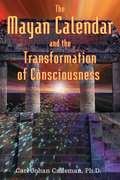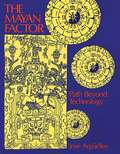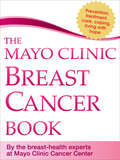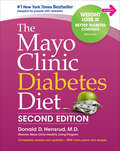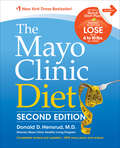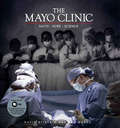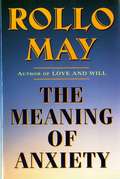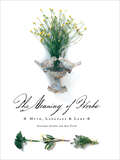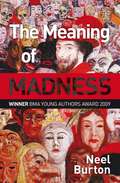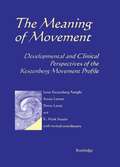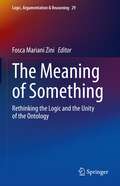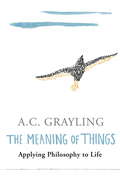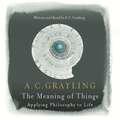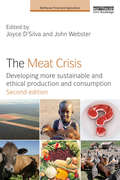- Table View
- List View
The Mayan Calendar and the Transformation of Consciousness
by Carl Johan CallemanReveals the Mayan calendar to be a spiritual device that describes the evolution of human consciousness from ancient times into the future• Shows the connection between cosmic evolution and actual human history• Provides a new science of time that explains why time not only seems to be speeding up in the modern world but is actually getting faster• Explains how the end of the Mayan calendar is not the end of the world, but a path toward enlightenmentThe prophetic Mayan calendar is not keyed to the movement of planetary bodies. Instead, it functions as a metaphysical map of the evolution of consciousness and records how spiritual time flows--providing a new science of time.The calendar is associated with nine creation cycles, which represent nine levels of consciousness or Underworlds on the Mayan cosmic pyramid. Through empirical research Calleman shows how this pyramidal structure of the development of consciousness can explain things as disparate as the common origin of world religions and the modern complaint that time seems to be moving faster. Time, in fact, is speeding up as we transition from the materialist Planetary Underworld of time that governs us today to a new and higher frequency of consciousness--the Galactic Underworld--in preparation for the final Universal level of conscious enlightenment. Calleman reveals how the Mayan calendar is a spiritual device that enables a greater understanding of the nature of conscious evolution throughout human history and the concrete steps we can take to align ourselves with this growth toward enlightenment.
The Mayan Code: Time Acceleration and Awakening the World Mind
by Carl Johan Calleman Barbara Hand ClowBestselling author Barbara Hand Clow shows how the Mayan Calendar is a bridge to galactic wisdom that fosters personal growth and human evolution • Unearths the meaning behind the calendar, its message for modern civilization, and what will happen when the calendar ends • Reveals how time acceleration is a manifestation of the acceleration of consciousness • By the author of The Pleiadian Agenda The Mayan Code is a deep exploration of how, as we approach the end of the Mayan Calendar, time and consciousness are accelerating, giving us a new understanding of the universe. Using Carl Johan Calleman’s research, as well as the ideas of other Mayan Calendar scholars, Barbara Hand Clow examines 16.4 billion years of evolution to decode the creative patterns of Earth--the World Mind. These great patterns culminate in 2011, and then during 2012 major astrological influences will inspire us to attain oneness and enlightenment. The Mayan Code shows how the time cycles of the Calendar match important periods in the evolutionary data banks of Earth and the Milky Way Galaxy. These stages of evolution are converging during the final stage of the Calendar, the period between 1999 and 2011. War and territoriality, resource management and separation from nature, are all part of daily events we must process during these few short years: evidence of the tightening spiral of time that we experience as time speeding up. Barbara Hand Clow counsels that our own personal healing is the most important factor as we prepare to make this critical leap in human evolution--now referred to as the awakening of the World Mind.
The Mayan Factor: Path Beyond Technology
by José ArgüellesVisionary historian Arguelles unravels the harmonic code of the ancient Maya providing valuable keys to understanding the next twenty years of human evolution.
The Mayan Prophecies for 2012
by Gerald BenedictA cataclysmic change to our way of life is looming as the winter solstice of 2012 heralds the end of the 5,000-year Mayan "Fourth Age". With its conclusion, will we see the end of the world as we know it, or the dawning of a new golden age?
The Mayo Clinic Breast Cancer Book: Prevention, Treatment, Care, Coping, Living with Hope
by Mayo Clinic Cancer Center"Excellent . . . Highly recommended for anyone involved in the fight against breast cancer—patients, doctors, family members, and researchers included.&” —Publishers Weekly (starred review) Whether you are facing a cancer diagnosis and the challenges of treatment; wish to prevent the disease if you&’re at high risk; or are caring for someone going through the experience, this book brings you the most accurate, reliable and up-to-date information available. You&’ll discover a story rich in hope, with accounts of women who&’ve successfully confronted this difficult disease. The knowledge you&’ll gain will help you be a more informed patient or caregiver—in communicating with doctors and selecting among treatment options. In this thorough book, the Mayo Clinic brings you critical knowledge in many key facets of breast cancer. Prevention: What can you do to decrease your risk? While there&’s still no guaranteed way to prevent breast cancer, several lifestyle factors can be modified to reduce your risk, especially if you are in a high-risk category. Treatment: After diagnosis comes a flurry of questions: Now what? How do I deal with this? Do I have options? What&’s my prognosis? The good news is that breast cancer is now considered a highly treatable disease with good results and increasing survival rates. The book reviews the full range of treatment options, and the pros and cons of each. Care and Coping: Life goes on after diagnosis. Doctors share their best options for dealing with emotions, coping with treatment side effects, and considering complementary therapies. A separate chapter offers helpful guidance to the patient&’s partner. Living With Hope: It bears repeating: Breast cancer is highly treatable. You have every reason to live with hope. This book offers key support for every woman. &“Medically sound . . . An empowering tool that soothes the sting and shock of a cancer diagnosis with up-to-date information and physician-supported advice.&” —Kirkus Reviews
The Mayo Clinic Diabetes Diet: Second Edition
by Donald HensrudThis #1 New York Times bestseller adapted for people with diabetes is full of tools and menus designed to kick-start weight loss to control your blood sugar. From Mayo Clinic — a leader in health and nutrition and the #1 ranked hospital for Diabetes and Endocrinology according to the 2018 U.S. News & World Report best hospital rankings — comes The Mayo Clinic Diabetes Diet, second edition. This reliable diet plan is designed to prevent and manageprediabetes and type 2 diabetes. The completely revised and updated second edition includes all-new recipes and an additional two weeks of daily menus.The Mayo Clinic Diabetes Diet, second edition is divided into two phases — Lose It! and Live It! — designed to help at-risk individuals prevent and control diabetes by losing weight quickly and safely, and then maintaining that weight loss. The Lose It! phase is a simple, straight-forward, two-week plan that encourages quick but safe weight loss that can help lower blood sugar. The Live It! phase of the diet offers basic and manageable steps and lifestyle changes and choices that are designed to help participants lose one to two pounds a week until a healthy weight is reached, and then to keep the pounds off. Mayo Clinic's weight-loss and nutrition experts have packed this book with meal plans, tools, menus, practical solutions, and specific tips on how to improve health and lose weight safely. The Mayo Clinic Diabetes Diet, tackles all the familiar obstacles that get in the way of weight loss—lack of exercise, resistance to healthy food, too little time to cook, a hectic schedule, struggles with cravings, and minimal support from family and friends. It’s a reliable and safe companion for losing weight and controlling diabetes. "This diabetes diet isn't a fad; it's about changing your habits for the better," states Donald Hensrud, M.D., Mayo Clinic nutrition specialist and medical editor. "With The Mayo Clinic Diabetes Diet, people can truly manage diabetes, eat well, lose weight and enjoy life."
The Mayo Clinic Diet: Second Edition
by Donald HensrudEat well. Enjoy life. Lose weight. This completely revised and updated edition of the popular Mayo Clinic Diet is a practical, no-nonsense approach to weight loss designed to help individuals lose weight and, most importantly, keep it off. The book includes to step-by-step advice on key behavior changes to promote weight loss, plus four weeks of daily menus and all-new recipes. The Mayo Clinic Diet is based on years of experience with literally thousands of individuals trying to lose weight. We’ve identified leading habits of people who maintain a healthy weight and the unhealthy habits of those who don’t. Based on this information, we’ve established five habits to include in your daily routine, five habits to break, and five bonus habits to increase your chances of lasting success. The Mayo Clinic Diet is composed of three sections to get you started, to keep you on track, and to give you the knowledge and tools you need to stay the course.1. Lose It! is a two week quick-start program designed to help you lose 6 to 10 pounds in a safe and healthy way. 2. Live It! is a long-term maintenance plan in which you continue to lose 1 to 2 pounds a week until you reach your goal. In the process, you learn how to maintain a healthy weight for life. 3. All the extra stuff includes meal plans, recipes, food lists, tips on overcoming challenges and much more. Best of all, the program is enjoyable. Eating is one of the great joys in life. What you eat on this diet has to taste good, or you won’t do it. The Mayo Clinic Diet emphasizes foods that are healthy and taste good. Plus, you don’t have to worry about starving yourself. When you’re hungry, you can eat. What works is a diet that’s easy and simple — a diet you can live with for life!
The Mayo Clinic Guide to Stress-Free Living
by Mayo Clinic Amit SoodHave you ever driven several miles without noticing anything on the road, or read a page in a book without registering any of it? Do the day's worries and disappointments crowd your mind as you're trying to fall asleep at night? Do you feel stressed much of the time and aren't sure how to find peace? In this book, Amit Sood, M.D., M.Sc., a Mayo Clinic specialist in stress and resiliency, reveals how the mind's instinctive restlessness and shortsightedness generate stress and anxiety and presents strategies for living a more peaceful life. The book is based on the highly popular stress management program offered at Mayo Clinic that Dr. Sood developed after two decades of work with tens of thousands of people.Drawing on groundbreaking brain research, Dr. Sood helps you understand the brain's two modes and how an imbalance between them produces unwanted stress. From this basis, you learn skills that will help you: Develop deep and sustained attention Practice gratitude, compassion and acceptance Live a meaningful life Cultivate nurturing relationships Achieve your highest potentialAll of these concepts are weaved into a practical and fun journey that has been tested in numerous scientific studies, with consistently positive results. Take the first step to discover greater peace and joy for you and your loved ones.
The Mayo Clinic: Faith, Hope, Science
by Ken Burns David BlisteinA photo-filled history of the world-renowned medical center, based on the award-winning PBS documentary by Ken Burns, Erik Ewers, and Christopher Loren Ewers. On September 30, 1889, W.W. Mayo and his sons Will and Charlie performed the very first operation at a brand-new Catholic hospital in Rochester, Minnesota. It was called Saint Mary&’s. The hospital was born out of the devastation of a tornado that had struck the town six years earlier, after which Mother Alfred Moes of the Sisters of Saint Francis told the Mayos that she had a vision of building a hospital that would &“become world renowned for its medical arts.&” Based on the film by acclaimed documentary filmmaker Ken Burns, The Mayo Clinic: Faith, Hope, Science chronicles the history of this unique organization, from its roots as an unlikely partnership between a country doctor and a Franciscan order of nuns to its position today as a worldwide model for patient care, research, and education. Featuring more than 400 compelling archival and modern images, as well as the complete script from the film, the book demonstrates how the institution&’s remarkable history continues to inspire the way medicine is practiced there today. In addition, case studies reveal patients, doctors, and nurses in their most private moments as together they face difficult diagnoses and embark on uncertain treatments. The film and this companion book tell the story of an organization that has managed to stay true to its primary value: The needs of the patient come first. Together they make an important contribution to the critical discussions about the delivery of health care today in America—and the world.
The McDougall Program
by John A. Mcdougall Mary McdougallIn this ground-breaking book, Dr. John McDougall, bestselling author and creator of the nationally renowned diet and exercise program at the St. Helena Hospital in Deer Park, California, introduces his remarkable twelve-day plan. Building on the idea that the traditional meat-rich American diet is hazardous to our health, Dr. McDougall has developed a medically sound, low-fat, starch-based diet that not only facilitates weight loss but also reverses serious illness, without drugs, and provides a broad range of dramatic and lasting health benefits. Step-by-step, he takes you through his revolutionary new program, providing: Over 130 easy-to-prepare recipes Delicious day-by-day menus Suggestions for healthful dining out Plus a comprehensive listing of health problems from arthritis to ulcer disease, comparing the traditional, often drastic medical approach and The McDougall Program's nutritionally based alternative. As featured in the book and movie Forks and Knives, John A McDougall delivers a powerful and effective food regiment.
The McDougall Program for Maximum Weight Loss
by John A. McdougallDrawing on the latest evidence about nutrition, metabolism, and hunger, an easy-to-follow weight loss plan places emphasis on a low-fat, high-carbohydrate diet while explaining how weight is lost and gained. .
The Meals to Heal Cookbook: 150 Easy, Nutritionally Balanced Recipes to Nourish You during Your Fight with Cancer
by Susan Bratton Jessica IannottaFrom the founder and the chief operating officer of Meals to Heal (a company that provides vetted nutritional information and prepared meals delivery to cancer patients and their families): 150 nutritionally balanced recipes created with an eye toward the special needs of cancer patients (e. g. mouth sores, nausea, and difficulty swallowing) who often suffer from malnutrition.
The Meaning of Anxiety (Revised Edition)
by Rollo MayIn this revised edition, Rollo May deepens his exploration into anxiety theory. Dr. May challenges the idea that mental health means living without anxiety, and he explores anxiety's potential for self-realization as well as ways to avoid its destructive aspects.
The Meaning of Herbs: Myth, Language & Lore
by Ann Field Gretchen ScobleThe fascinating history and uses of these versatile botanicals through the ages, from love potions to self-care—from the authors of The Meaning of Flowers. &“Take borage for courage. Send a bouquet of yarrow to declare war. Hang a sprig of rue at the door to keep witches at bay.&” Like flowers, herbs are steeped in myth and magic, secrets and lore. For centuries, their powers have been called upon to seduce lovers and dispel witches, send hidden messages and brew potent elixirs, entice the palate and soothe the mind. Illustrated with enchanting collages by acclaimed artist Ann Field, this delightful tribute to the meaning and magic of herbs offers a contemporary introduction to an age-old tradition. The text draws on botanical, mythological, and historical sources worldwide, from ancient Rome to Victorian England, from Asia to the Americas, presenting profiles of over fifty herbs favored through the ages. Blending fact, folktale, natural history, and original art, The Meaning of Herbs explores the language and lore of nature&’s most versatile and powerful gifts.
The Meaning of Madness
by Neel BurtonThis book proposes to open up the debate on mental disorders, to get people interested and talking, and to get them thinking. For example, what is schizophrenia? Why is it so common? Why does it affect human beings and not animals? What might this tell us about our mind and body, language and creativity, music and religion? What are the boundaries between mental disorder and 'normality'? Is there a relationship between mental disorder and genius? These are some of the difficult but important questions that this book confronts, with the overarching aim of exploring what mental disorders can teach us about human nature and the human condition. Dr Neel Burton qualified in neuroscience and medicine from the University of London and is a Member of the Royal College of Psychiatrists. He is the the author of several books, including a prize-winning textbook of psychiatry and a prize-winning self-help book for people with schizophrenia. He lives and teaches in Oxford.
The Meaning of Movement: Developmental and Clinical Perspectives of the Kestenberg Movement Profile
by Janet Kestenberg Amighi Susan Loman Penny Lewis K. Mark SossinThe primary objective of this book is to present the Kestenberg Movement Profile (KMP)--a multi-tiered system for the notation of observed movement patterns, classification of these patterns, and analysis of an individual's movement repertoire.
The Meaning of Something: Rethinking the Logic and the Unity of the Ontology (Logic, Argumentation & Reasoning #29)
by Fosca Mariani ZiniThis innovative volume investigates the meaning of ‘something’ in different recent philosophical traditions in order to rethink the logic and the unity of ontology, without forgetting to compare these views to earlier significative accounts in the history of philosophy. In fact, the revival of interest in “something” in the 19th and 20th centuries as well as in contemporary philosophy can easily be accounted for: it affords the possibility for asking the question: what is there? without engaging in predefined speculative assumptions The issue about “something” seems to avoid any naive approach to the question about what there is, so that it is treated in two main contemporary philosophical trends: “material ontology”, which aims at taking “inventory” of what there is, of everything that is; and “formal ontology”, which analyses the structural features of all there is, whatever it is. The volume advances cutting-edge debates on what is the first et the most general item in ontology, that is to say “something”, because the relevant features of the conceptual core of something are: non-nothingness, otherness. Something means that one being is different from others. The relationality belongs to something.: Therefore, the volume advances cutting-edge debates in phenomenology, analytic philosophy, formal and material ontology, traditional metaphysics.
The Meaning of Things: Applying Philosophy to life
by A.C. GraylingA refreshing distillation of insights into the human condition, by one of the best-known and most popular philosophers in the UK.Thinking about life, what it means and what it holds in store does not have to be a despondent experience, but rather can be enlightening and uplifting. A life truly worth living is one that is informed and considered so a degree of philosophical insight into the inevitabilities of the human condition is inherently important and such an approach will help us to deal with real personal dilemmas.This book is an accessible, lively and thought-provoking series of linked commentaries, based on A. C. Grayling's 'The Last Word' column in the GUARDIAN. Its aim is not to persuade readers to accept one particular philosophical point of view or theory, but to help us consider the wonderful range of insights which can be drawn from an immeasurably rich history of philosophical thought.Concepts covered include courage, love, betrayal, ambition, cruelty, wisdom, passion, beauty and death. This will be a wonderfully stimulating read and act as an invaluable guide as to what is truly important in living life, whether facing success, failure, justice, wrong, love, loss or any of the other profound experience life throws out.
The Meaning of Things: Applying Philosophy to life
by Prof A.C. GraylingA refreshing distillation of insights into the human condition, by one of the best-known and most popular philosophers in the UK.Thinking about life, what it means and what it holds in store does not have to be a despondent experience, but rather can be enlightening and uplifting. A life truly worth living is one that is informed and considered so a degree of philosophical insight into the inevitabilities of the human condition is inherently important and such an approach will help us to deal with real personal dilemmas.This book is an accessible, lively and thought-provoking series of linked commentaries, based on A. C. Grayling's 'The Last Word' column in the GUARDIAN. Its aim is not to persuade readers to accept one particular philosophical point of view or theory, but to help us consider the wonderful range of insights which can be drawn from an immeasurably rich history of philosophical thought.Concepts covered include courage, love, betrayal, ambition, cruelty, wisdom, passion, beauty and death. This will be a wonderfully stimulating read and act as an invaluable guide as to what is truly important in living life, whether facing success, failure, justice, wrong, love, loss or any of the other profound experience life throws out.
The Meaning of Things: Applying Philosophy to life
by Prof A.C. GraylingThinking about life, what it means and what it holds in store does not have to be a despondent experience, but rather can be enlightening and uplifting. A life truly worth living is one that is informed and considered so a degree of philosophical insight into the inevitabilities of the human condition is inherently important and such an approach will help us to deal with real personal dilemmas.This book is an accessible, lively and thought-provoking series of linked commentaries, based on A.C Grayling's 'The Last Word' column in the Guardian. Its aim is not to persuade readers to accept one particular philosophical point of view or theory, but to help us consider the wonderful range of insights which can be drawn from an immeasurably rich history of philosophical thought.Read by AC Grayling(p) 2005 Orion Publishing Group
The Measles Book: Thirty-Five Secrets the Government and the Media Aren't Telling You about Measles and the Measles Vaccine (Children’s Health Defense)
by Children's Health DefenseDiscover thirty-five secrets that the media, US government, and Big Pharma don't want you to know about vaccines. Measles! We all have seen or heard the scary stories about &“outbreaks&” in the media. It has even been declared a &“public health emergency&” at various times. Is it true? Are we and our children at risk? The Measles Book: Thirty-Five Secrets the Government and the Media Aren&’t Telling You about Measles and the Measles Vaccine will help you answer these questions. You will find out if this is just another example of the media, government, and industry misleading us or whether we really have a lot to worry about. The Measles Book presents reliable medical information from the most credible sources available. It is intended to help you make an informed choice about vaccinating your child. The main focus is measles, but many of the issues are relevant to other childhood vaccines. Within the book's pages, the reader will discover thirty-five secrets being kept from the general public about childhood vaccines, especially the measles vaccine. Just a sampling of these secrets include: Vaccines are not safe for every child and the government and pharmaceutical companies have known this for years.Some children will get injured or die from vaccines and the government and pharmaceutical companies know this, too.Pharmaceutical companies have developed an incredible way to make money from vaccines, and not be held accountable.When a child is injured or killed by a vaccine, the pharmaceutical company does not pay for the damage it caused—we do! Learn the other thirty-one secrets when you read The Measles Book by Children's Health Defense, a nonprofit organization committed to the health of our children and challenging misinformation spread by Big Pharma, the government, and the media. The information in The Measles Book is vital for parents to know so they can make informed decisions for their children.
The Measure of Madness
by Philip GerransIn The Measure of Madness, Philip Gerrans offers a novel explanation of delusion. Over the last two decades, philosophers and cognitive scientists have investigated explanations of delusion that interweave philosophical questions about the nature of belief and rationality with findings from cognitive science and neurobiology. Gerrans argues that once we fully describe the computational and neural mechanisms that produce delusion and the way in which conscious experience and thought depend on them, the concept of delusional belief retains only a heuristic role in the explanation of delusion.Gerrans proposes that delusions are narrative models that accommodate anomalous experiences. He argues that delusions represent the operation of the Default Mode Network (DMN) -- the cognitive system that provides the raw material for humans' inbuilt tendency to provide a subjectively compelling narrative context for anomalous or highly salient experiences -- without the "supervision" of higher cognitive processes present in the nondelusional mind. This explanation illuminates the relationship among delusions, dreams, imaginative states, and irrational beliefs that have perplexed philosophers and psychologists for over a century. Going beyond the purely conceptual and the phenomenological, Gerrans brings together findings from different disciplines to trace the flow of information through the cognitive system, and applies these to case studies of typical schizophrenic delusions: misidentification, alien control, and thought insertion. Drawing on the interventionist model of causal explanation in philosophy of science and the predictive coding approach to the mind influential in computational neuroscience, Gerrans provides a model for integrative theorizing about the mind.
The Measure of Madness: Philosophy of Mind, Cognitive Neuroscience, and Delusional Thought (Life and Mind: Philosophical Issues in Biology and Psychology)
by Philip GerransDrawing on the latest work in cognitive neuroscience, a philosopher proposes that delusions are narrative models that accommodate anomalous experiences.In The Measure of Madness, Philip Gerrans offers a novel explanation of delusion. Over the last two decades, philosophers and cognitive scientists have investigated explanations of delusion that interweave philosophical questions about the nature of belief and rationality with findings from cognitive science and neurobiology. Gerrans argues that once we fully describe the computational and neural mechanisms that produce delusion and the way in which conscious experience and thought depend on them, the concept of delusional belief retains only a heuristic role in the explanation of delusion.Gerrans proposes that delusions are narrative models that accommodate anomalous experiences. He argues that delusions represent the operation of the Default Mode Network (DMN)—the cognitive system that provides the raw material for humans' inbuilt tendency to provide a subjectively compelling narrative context for anomalous or highly salient experiences—without the “supervision” of higher cognitive processes present in the nondelusional mind. This explanation illuminates the relationship among delusions, dreams, imaginative states, and irrational beliefs that have perplexed philosophers and psychologists for over a century.Going beyond the purely conceptual and the phenomenological, Gerrans brings together findings from different disciplines to trace the flow of information through the cognitive system, and applies these to case studies of typical schizophrenic delusions: misidentification, alien control, and thought insertion. Drawing on the interventionist model of causal explanation in philosophy of science and the predictive coding approach to the mind influential in computational neuroscience, Gerrans provides a model for integrative theorizing about the mind.
The Measurement of Affect, Mood, and Emotion
by Panteleimon EkkekakisThe role of affective constructs in human behavior in general, and health behavior in particular, is recapturing the attention of researchers. Affect, mood, and emotion are again considered powerful motives behind dietary choices, physical activity participation, cigarette smoking, alcohol over-consumption, and drug abuse. However, researchers entering the fray must confront a vast and confusing theoretical and technical literature. The enormity of this challenge is reflected in numerous problems plaguing recent studies, from selecting measures without offering a rationale, to interchanging terms that are routinely misconstrued. The Measurement of Affect, Mood, and Emotion cuts through the jargon, clarifies controversies, and proposes a sound three-tiered system for selecting measures that can rectify past mistakes and accelerate future progress. Panteleimon Ekkekakis offers an accessible and comprehensive guidebook of great value to academic researchers and postgraduate students in the fields of psychology, behavioral and preventive medicine, behavioral nutrition, exercise science, and public health.
The Meat Crisis: Developing more Sustainable and Ethical Production and Consumption (Earthscan Food and Agriculture)
by John Webster Joyce D'SilvaMeat and dairy production and consumption are in crisis. Globally, 70 billion farm animals are used for food production every year. It is well accepted that livestock production is a major contributor to greenhouse gas emissions. The Food and Agriculture Organization of the United Nations (FAO) predicts a rough doubling of meat and milk consumption in the first half of the 21st century, with particularly rapid growth occurring in the developing economies of Asia. What will this mean for the health and wellbeing of those animals, of the people who consume ever larger quantities of animal products, and for the health of the planet itself? The new edition of this powerful and challenging book explores the impacts of the global growth in the production and consumption of meat and dairy, including cultural and health factors, and the implications of the likely intensification of farming for both small-scale producers and for animals. Several chapters explore the related environmental issues, from resource use of water, cereals and soya, to the impact of livestock production on global warming and issues concerning biodiversity, land use and the impacts of different farming systems on the environment. A final group of chapters addresses ethical and policy implications for the future of food and livestock production and consumption. Since the first edition, published in 2010, all chapters have been updated, three original chapters re-written and six new chapters added, with additional coverage of dietary effects of milk and meat, antibiotics in animal production, and the economic, political and ethical dimensions of meat consumption. The overall message is clearly that we must eat less meat to help secure a more sustainable and equitable world.
